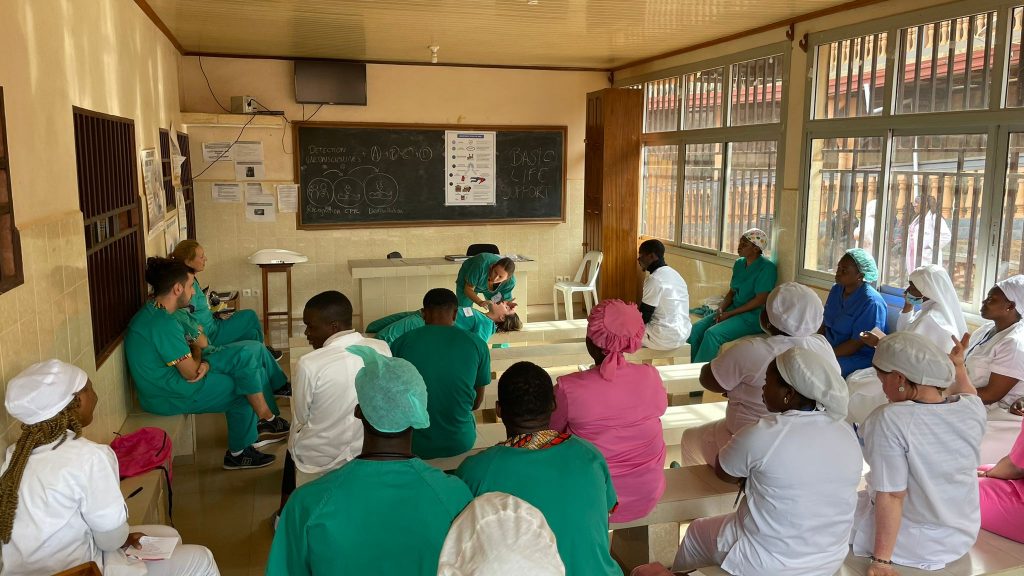23/05/2023
URV Medicine has taken part in a surgical campaign in Cameroon
Together with professionals from various health centres, they assessed up to 45 patients, 14 of whom required surgical intervention

Together with professionals from various health centres, they assessed up to 45 patients, 14 of whom required surgical intervention
Several doctors from the University Hospital of Tarragona Joan XXIII and members of the Bachelor’s Degree in Medicine of the URV carried out a solidarity surgical campaign in Cameroon. They moved to the sub-Saharan country where they evaluated up to 45 patients, 14 of whom were in need of a surgical intervention.
The team at the Joan XXIII University Hospital consisted of three surgical specialists, all professors associated with the URV, a general surgery resident and an anaesthesia resident. There was also a student on the Bachelor’s Degree in Medicine, Alejandra Manzano. The expedition, coordinated by URV associate professor Marc Vallvè, also involved several health professionals from different specialities and different national hospital centres.
The aims of the health services were to provide surgical assistance to patients with cervical endocrine pathology, to assist the surgery unit where surgical indications of patients with thyroid or parathyroid-related problems are diagnosed and reviewed, and to train local personnel. Alejandra Manzano also used the experience as the basis for her bachelor’s degree thesis.
The expedition travelled in October, but the local population had previously been informed so that potential patients would go to the Hospital Nôtre Dame de la Santé de Batseng’la, a small Hospital of about 100 beds, where this project was carried out. Various pieces of medical equipment were donated to the hospital, which had been donated by various health centres in Spain. Training workshops were also held on perioperative patient management, basic cardiopulmonary resuscitation (CPR), advanced CPR, venous access and antibiotic therapy.
The project lasted seven days, and up to 45 patients were treated, 14 of whom required surgical intervention. The various interventions involved local professionals and expatriates, who were able to share knowledge about the pathologies that were treated.

Traditional medicine and the high cost of specialisation are the main difficulties faced by local doctors
The campaign was a success, but there were some difficulties, such as the population’s distrust of treatments, since traditional medicine is strongly rooted in much of African culture. In some cases, patients with surgical needs refused the intervention for cultural reasons.
On this issue, the medical student says that “It is frustrating to see them reject the intervention, but we see it from our perspective. We must bear in mind that it is another culture, they do not have the knowledge that we do, and traditional medicine is very present in their society. It is frustrating when patients refuse operations that could give them a better quality of life. In the end, the fear comes from misinformation.”
Several solutions to these problems are being studied. One is for local surgeons to be hosted by national hospitals to improve their training, and another is to organise awareness-raising campaigns.
Manzano described one of the situations that made a big impression on her because it showed the empathy that is so characteristic of Cameroonian society: “We were on our rounds and one of the patients was scared because she was by herself in a room, and afraid of the surgery and postoperative stage. We took her to meet the patients who had already had their operations and it helped her a lot. Everybody helped to squeeze another bed into a very small room so that she would feel better. This made a big impression on me!”
This surgical campaign was just one of the pilot tests involved in starting up the new database on international development cooperation, which is being developed by the Humanitarian Collaboration Group of the Spanish Association of Surgeons.
Motivated by the low numbers of medical students involved in international development cooperation projects, Alexandra Manzano did her bachelor’s degree thesis on this issue and collected data to improve surgical care in areas of limited resources, particularly focused on cervical endocrine surgery. Her thesis will present the data and the results of her experience in Africa. Manzano says that her aim is to finish her training, go on to specialise and remain involved in international cooperation projects, such as the one in Batseng’la. The project was partly funded by the URV Solidària, which covered the student’s travel, support and insurance costs through the project’s call for international cooperation. Much of the material that was delivered to the Hospital Nôtre Dame de la Santé was provided by the University Hospital of Tarragona Joan XXIII.
